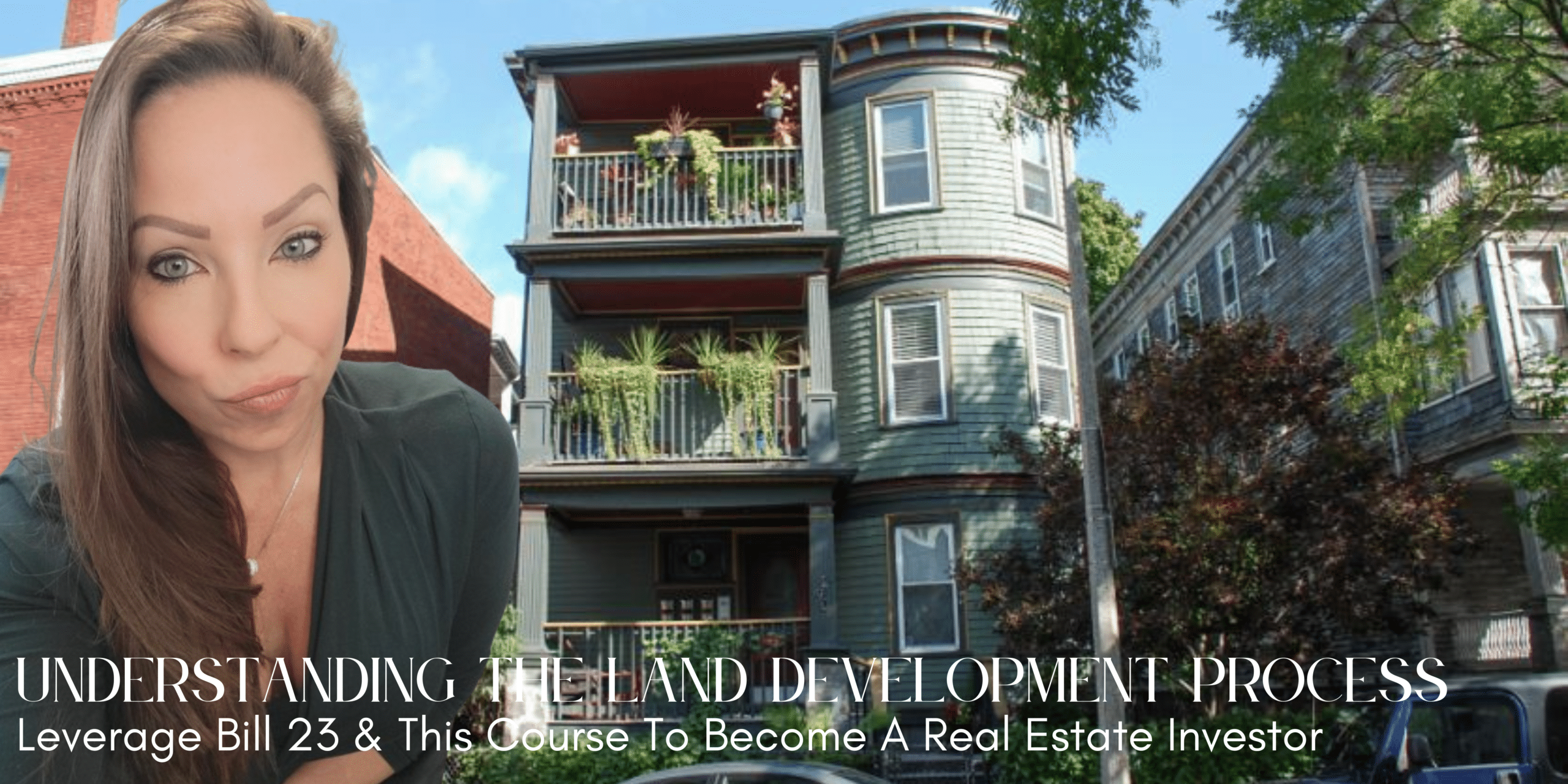
Understanding the land development process.
Are you interested in taking a more active role with your real estate investment strategy with a focus on land development but need to understand more about the process? Well, you’re in luck! I’m here to share with you a course dedicated to helping you understanding all of the in’s and out’s of the land development process to help you achieve your goals and succeed in this high demand need.
If you want to take on your dream development project this year and take advantage of all of the bonuses that come along with Bill 23, then this is something you won’t want to miss. Darren Voros is launching “The Ultimate Land Development Course” this spring. You can read more about this below.
Now, I want you to first understand why understanding land development process is more important than ever. As you likely already know, Ontario is facing a major housing supply shortage. To make sure more homes get built more quickly, the government introduced Bill 23. This bill affects everything from the housing and building sectors to renters, the conservation authorities, development charges, budgets, consumer protections and more.
Understanding the land development process is going to get a little easier thanks to Bill 23, but it could make renting more costly, will allow for a massive urban sprawl and may result in some cuts to funding in some municipalities.
Here are some of the top things you should be aware of when it comes to Bill 23 as well as how this will impact the land development process here in Ontario.
- Development Fees Are Changing: this is probably one of the biggest benefits land developers will gain from Bill 23. Development fees are essentially going to be exempt for a 2nd and 3rd unit on a residential property for those built by non-profits and co-ops to help make housing more affordable. The governments definition of affordable housing are units rented out at 80% of the average market rent for 25 years or more, or sold at 80% of the average sale price. In addition, there are also going to be fee reductions for purpose built rental apartments no protected by rent control. This will be 15% for a one bedroom and 25% for a three bedroom apartment.
- Zoning Rules Are Changing: Bill 23 will allow for up to three homes on a property in ALL neighbourhoods across Ontario. This is a huge change to the land development process which has been far more narrow in its allowances in the past. This said, the square footage of the building will need to remain the same and the heigh must still abide by municipal bylaws. Ultimately, this will increase density within existing neighbourhoods, which helps reduce urban sprawl but will also put increased pressure on our infrastructure and resources. Municipalities are being given one year to update their bylaws to reflect Official Plan policies considering transit.
- The Power of Conservation Authorities is Changing: the Ontario government is reducing the capacity and power that the conservation authorities currently have to protect our environment. So, what does this mean exactly? Basically gutting these authorities will make it easier for land developers to build on farmland, wetlands and fields. As development takes hold and suburban sprawl grows, this is expensive for municipalities since it costs more to provide services and could potentially lock cities/towns into unsustainable transportation.
- Third Party Appeals Are Changing: the applicant (usually a developer) can appeal as can the municipality, but resident and environmentalists cannot unless they are given specific permission to do so. An adjudicator can also order the losing party to pay costs.
- Rules Around Renters Are Changing: any renters who live in purpose build rental buildings could find themselves at risk of being evicted. The Ontario government is giving itself permission to ban and restrict city rules that require developers, currently, to return a tenant to their rent-controlled apartment after construction of the new bigger condo is completed. While we do need more homes, it can be argued that this shouldn’t come at the cost of affordable homes for renters.
As you can appreciate, Bill 23 is a huge bill and will have a massive impact on the land development process. If you’re interested in taking a more active role as a real estate investor and undertake a land development project in the new year, then Darren Voros’ Ultimate Land Development Course would be hugely beneficial to you to better understand the land development process.

Throughout this course, you understand the in’s and out’s of the land development process and will learn:
- How to identify and find the right kinds of development opportunities
- Analyze and underwrite potential developments
- Secure the necessary financing for your land development project
- How to raise capital for your project
- Choose the most profitable exit and timeline
Darren Voros’ Ultimate Land Development Course Includes:
– A 3-day in-person event
– In-person site visits TO ACTIVE PROJECTS
– 12-weeks live online class
– 10+ learning modules
– Interactive assignments
– 12-week group coaching sessions with Darren
– And much more!
To find out more about this course and to register, click here. To get $1000 off the course, use the promo code SERENA.
If you liked this article, you may also enjoy:
– Understanding Cap Rates for Investors
– Infinite Banking Concept for Real Estate Investors
– Tax Flipping Houses
If land development isn’t a direct you want to take and are in the market to buy, sell or invest in other ways, let’s talk! I can be reached at 647.896.6584, by email at info@serenaholmesrealtor.com or by filling out this simple contact form.
For plenty of other great tips, let’s connect on social and make sure you’ve subscribed to my YouTube Channel.










